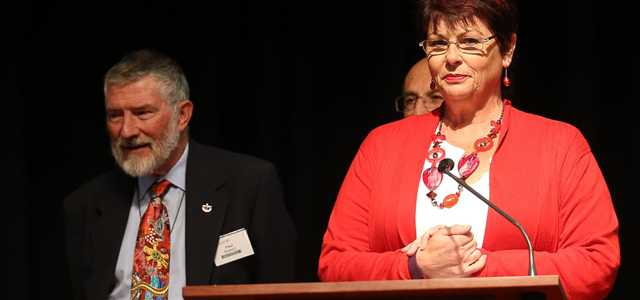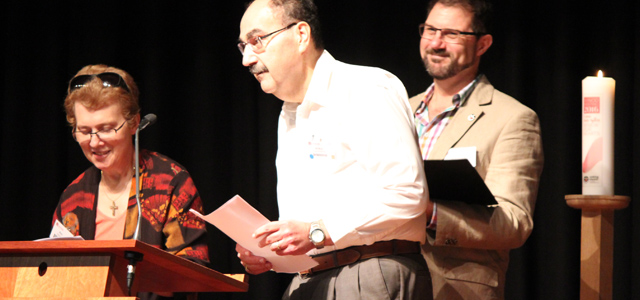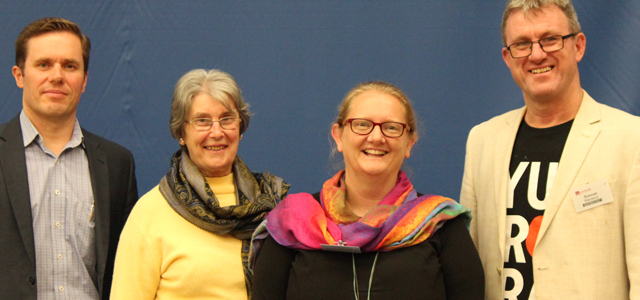
Projects and Campaigns

Inspiration can be found in all areas of the UCA, such as in the many, varied projects and campaigns across our Church. Hearing and seeing mission in action at Synod delivers insights for learning, wisdom for innovation and, sometimes, the spark an idea needs to be ignited into life.
Rural Ministry and the Salt Bush Project
Rev. Karyn Burchell-Thomas, Presbytery Resource Minister for Macquarie Darling and Rural Ministry Unit Chairperson, began her report with a summary of the Unit’s activities. “In the last few years, we’ve looked very closely at the lives of rural ministers and … at rural ministry right across the entire Synod,” she noted.
The Unit has embarked upon research — which may take a number of years (“perhaps a lifetime”, noted Karen) — to ascertain how to work and be in the rural and remote places of the Synod. She mentioned that for the first time, three rural Presbyteries are talking strategically and collaborating about the future of the Church and rural ministry.
The Rev. Jo Smallville is a patrol minister for the Cobar/Nyngan area and ministers to roughly 300 rural properties in this area. Jo is paid half-time for this ministry and discussed the challenges of minstering to this vast area. She outlined the diverse nature of her ministry, and the challenges, joys and concerns she has for those in rural NSW.
With no other ordained minister from any other denomination based in Cobar, its people are justly concerned that funding won’t be available for Jo to continue. As a result, she would become another service that won’t be available.
“I believe that I am called to be the presence of God to people in outback Australia with a purpose of meeting their social, pastoral and spiritual needs, and to build strong relationships of mutual trust and respect; treating all people as valued, worthwhile and loved members of the community,” said Jo.
By its very nature, rural and remote ministry will never be self-funding. “I can’t visit people on properties who haven’t drawn a wage for five years and ask them to pay for my petrol,” explained Jo. “Nor can I expect them to travel hundreds of kilometres to fill the pews on Sunday morning.
“One of Jesus’s favourite words was ‘Go!’ Go into the world preaching and teaching and making disciples. Go and heal the sick, visit the lonely, feed the hungry. Go and love. Go and serve. And that’s what our rural and remote ministers and chaplains do. They go out into the world and meet the needs of the people where they are. But we can’t do this if the Church as a whole cannot support our ministry.”
“My prayer for this meeting is that God will help us find the funding for rural and remote ministry so that the people of the country living in isolation can continue to receive the much needed pastoral, spiritual, social and community needs that they deserve.”
Members also heard from Patrol Minister David Shrimpton. Having relocated from the Northern Territory to Broken Hill, he has never experienced such extreme drought conditions.
“I’ve spoken with people in the tough times,” said David. “I have also seen them on their properties when they are on their own and isolated. It’s an important role … one where the Church needs to be involved.”
While all of this information is not new to our Church, radical action is required if the work is to be supported. Hoping to be such action is ‘The Salt Bush Project’, which was brought to members of Synod by Rural Ministry Consultant Rev. Bronwyn Murphy.
“The tenacity and the resilience of the rural church is reflected in the image of ‘old man salt bush’. In times of extreme hardship, the salt bush is the farmer’s friend. Sturdy and tough, this plant provides nourishment, feeding stock in times of drought and crop failure. No matter how heavily it is chopped back, salt bush keeps on regrowing.”
“Like salt bush, the people of rural and remote areas of this Synod are resilient and strong. The rural church is now largely lay-led. Ministry in these areas has always been valued in this Synod. Funding has always been ad hoc and always relied on the generous giving of city Congregations,” said Bronwyn.
Funding for these ministries is now even more vital. Synod was asked to discuss sustainable funding for The Salt Bush Project, such as approaching Congregations and Presbyteries to consider supporting it through something like Living is Giving. Synod members were asked to prioritise the important work of the rural Church.
Sales Proceeds Policy approved
The new “Proceeds of Sale Policy” was approved on Day One of Synod. It’s the outcome of the “Property for a Pilgrim People” program, which consulted widely across the Synod during the past few years (led by Rev. Niall Reid).
“During 2014, through the ‘Property for a Pilgrim People’ workshops and consultations, it was very clear to me that we are a Church wandering about in the wilderness looking for the promised land,” explained Rev. Reid in his introduction to the Proceeds of Sale Policy.
“It was also clear to me that there are many people who really want to be faithful to God, live as disciples of Jesus and be about his transforming work, but they just do not know where to start. Many recognised that we have to let go: of previous ways of doing things; ways of being in ministry; ways of giving expression to the faith; and ways of thinking about property and how we use it.”
Key points of the Policy:
- The primary purpose of property is to serve the mission of God through the life of the Church in its worship, witness and service.
- It is recommended that all Congregations, Presbyteries and Synod establish Mission Plans (including how property supports mission).
- Retaining or disposing of property is to be determined through a discernment process (part of an ongoing mission planning process).
- The Policy establishes a consultation process to create a collaborative discernment process to determine how resources best serve mission, locally and across the wider Synod.
- When considering the use of proceeds, generosity is encouraged, recognising the common wealth of property and missional needs across the Synod.
- UAICC is to be consulted where sales occur.
- Sharing with the wider Synod under this Policy has two minimum default rates based on the net proceeds’ value. However, the policy allows for sharing to range.
- Proceeds are not to be used to fund normal operational expenses, such as the payment of salaries and stipends, or the ongoing maintenance of property.
- Existing sales proceeds are to be reviewed by April 2018.
- Presbyteries are now included in this Policy.
- Exemptions are noted.
Click here for the full policy
A new Presbytery is born
A proposal brought to Synod to amalgamate the Ku-ring-gai and Central Coast Presbyteries was passed unanimously, with an entertaining presentation that outlined the challenging and exciting times ahead for the newly formed Sydney Central Coast Presbytery.
The Presbytery wants to bring a fresh approach to mission, for the future of the Church. Efficiency and effectiveness will be a major focus; efficiency in Presbytery responsibilities, so they can be effective in living the Church’s values.
“We will take seriously our commitment to engage with the wider Synod,” noted Rev. Ann Hogan. “Finding, freeing and sharing resources, including from excess property, for the common good.”
“We offer the Sydney Central Coast Presbytery as an example of how we might be able to rethink our governance and oversight in the Church,” noted Rev. Graham Perry.
The new Presbytery will be formed with a service of recognition at Turramurra Uniting Church on 22 June.
Seeds of Hope campaign launched
The ‘Seeds of Hope’ campaign has been designed to help the Uniting Church act as an agent of change and transformation in communities.
Uniting has collaborated with Congregations, Presbyteries and Uniting Mission and Education to produce the Seeds of Hope resource for local Congregations.
This campaign is part of a bigger agenda to bring renewal to Congregations across the Synod. The focus of the campaign is based around Jesus’s Parable of the Mustard Seed (Mark 13:31-32) and what it signifies.
Key aims of the campaign:
- To celebrate past achievements and develop a sense of pride about our history and legacy and the work the Uniting Church has done in the community.
- To examine our rapidly changing context, looking to our response to the challenges ahead, and who might be our leaders.
- To awaken a new mindset, which will prepare us to be the people God would have us be.
The Seeds of Hope campaign was launched with a video. Click here to view it, as well as more information about the campaign.






























































